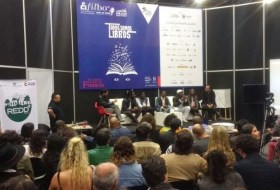News
Unicauca students presented stories about the Caucan Pacific at the International Book Fair
During the recent Book Fair held in Bogota the results of a call for literary creation of the Instituto Caro y Cuervo were announced. These, narrated the feeling and the experiences of the coast.
"For four months of the previous year we met with Caro and Cuervo and Fundo Acción to write a series of stories about the Pacific and the territory, and how nature communicates with the people themselves," said Pilar Madrid Peña, a Social Communication student from the University of Cauca.
She made reference to her participation as a student, along with other students from Law and Modern Languages, in which they expressed their experiences and feelings within the framework of preserving the natural and cultural resources of the Caucan Pacific Coast.
She pointed out that this experience led them to be part of one of the forums in the recent International Book Fair of Bogota and began when "we as a Palenque University of Cauca, who are registered in the University of Cauca, take the initiative to undertake a major in literary creation, from there we received the call from the Instituto Caro y Cuervo, then we participated directly."
The story written by Pilar is about the life of a couple from the Pacific in a place near the Guaguí river, Guapi jurisdiction, a couple who gain their livelihood from fishing and its commercialization in their local market. "What I want to tell through this story is how social change and how change in the ecosystem damages the fabric within the family."
She emphasized that socializing his literary work's result in the Colombian capital "was an experience, being able to tell something that for us as part of the Pacific, but to those who are on the outside do not know, it is a way to bring them closer and show another face of the Pacific.
The Palenque Universitario del Cauca, of which it is part, is a group formed by Afro-descendant students who arrive in the city of Popayán with the objective of continuing a higher education.
"We were many black students who lived in Popayán but we did not find a place of our own, then we began to integrate ourselves through rumba, through food, and in the end it was transformed. A group of action was created with political and academic mobilization” said Madrid Peña.
MORE INFO
More information@palenkeuniversitariodelcauca
CREDITS AND CONTACTS
DRAFTING: C.S. Ferney Meneses Área de Prensa - prensa@unicauca.edu.co - Tel. 8209800 Ext. 2480
WEB EDITOR: C.S. Carlos Alberto Pérez - digital@unicauca.edu.co - Tel. 8209800 Ext. 2482


